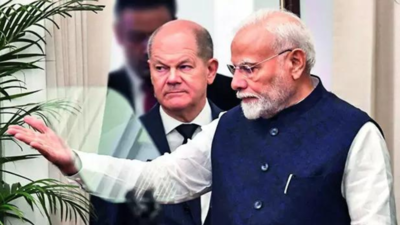The 7th India-Germany intergovernmental consultations (IGC) co-chaired by PM Narendra Modi and Chancellor Olaf Scholz resulted in 8 major outcomes, including a Mutual Legal Assistance Treaty that is expected to bolster joint efforts against terrorism and separatist elements.
Scholz appreciated India’s support for just and lasting peace in Ukraine, and the readiness to use its ties with all parties to facilitate a political solution, as Modi maintained war cannot solve any problem and stressed India stood ready to make every possible contribution towards restoration of peace. With delivered and pledged assistance worth 28 billion euro, Germany is second only to the US in providing military aid to Ukraine.
Speaking earlier at the Asia-Pacific Conference of German Business, in the presence of Modi, the Chancellor warned if Russia succeeded with its “illegal brutal” war against Ukraine, there would be repercussions far beyond Europe’s borders. Such an outcome, he added, would endanger global security and prosperity as a whole.
Launched in 2011, IGC allows comprehensive review of ties as well as identification of new areas of cooperation at the cabinet level. Another important agreement signed was for exchange of classified information that, Modi said, reflected deep mutual trust between the 2 countries amid growing defence and security cooperation.
Reaffirming commitment to green and sustainable development, both leaders launched an Indo-German Green Hydrogen Roadmap. Among geopolitical issues, the Russia-Ukraine war, West Asia conflict and Indo-Pacific situation were discussed in detail in the meeting.
“The ongoing conflicts in Ukraine and West Asia are a matter of concern for both countries. India has always maintained that war cannot solve any problem at all and stands ready to make every possible contribution towards the restoration of peace,’’ said Modi, at a joint press event after the wide-ranging talks.
In a joint statement, India and Germany also delivered a message to Russia that the threat of use of nuclear weapons is unacceptable.
In his opening remarks, Modi also raised the issue of tensions in the Indo-Pacific saying there are serious concerns about the rule of law and freedom of navigation in the region. “In such times, the strategic partnership between India and Germany has emerged as a strong anchor,’’ he said. Scholz will travel to Goa on Saturday where the German naval frigate Baden-Wuerttemberg and combat support ship Frankfurt am Main, as announced by the Indian government earlier, will make a port call as part of Germany’s Indo-Pacific deployment.
The leaders underlined the need for reforms in multilateral institutions, particularly the UN Security Council, with Modi saying global forums created in the twentieth century are not capable of addressing challenges of the 21st century. Both India and Germany are members of the G4, along with Brazil and Japan, that seeks expansion of the Security Council and supports each other’s candidature for permanent membership. Scholz also backed an ambitious India-EU FTA, which remains under discussion, underscoring the “enormous potential” to further build and expand trade and investment between the 2 countries.
In his remarks at the media event, Scholz said no one can close their eyes to the Russia-Ukraine war and its effects. “This war, which has been raging for so long now and is claiming so many victims, must finally come to an end. The integrity and sovereignty of Ukraine must be preserved,” Scholz said, adding Russia’s aggression had put under strain the international rules-based order. Scholz also said it was significant that India was an anchor of stability in South Asia in these times.
On other areas of cooperation Modi said that a whole-of-government approach to Critical and Emerging Technologies, Skill Development, and Innovation had also been agreed upon. “This will strengthen cooperation in areas such as Artificial Intelligence, Semiconductors, and Clean Energy. It will also help in building secure, trusted, and resilient global supply value chains,’’ he said.
Welcoming Germany’s Skilled Labour Strategy released for India, Modi said he was confident that India’s young talent pool will get better opportunities to contribute to Germany’s development.
